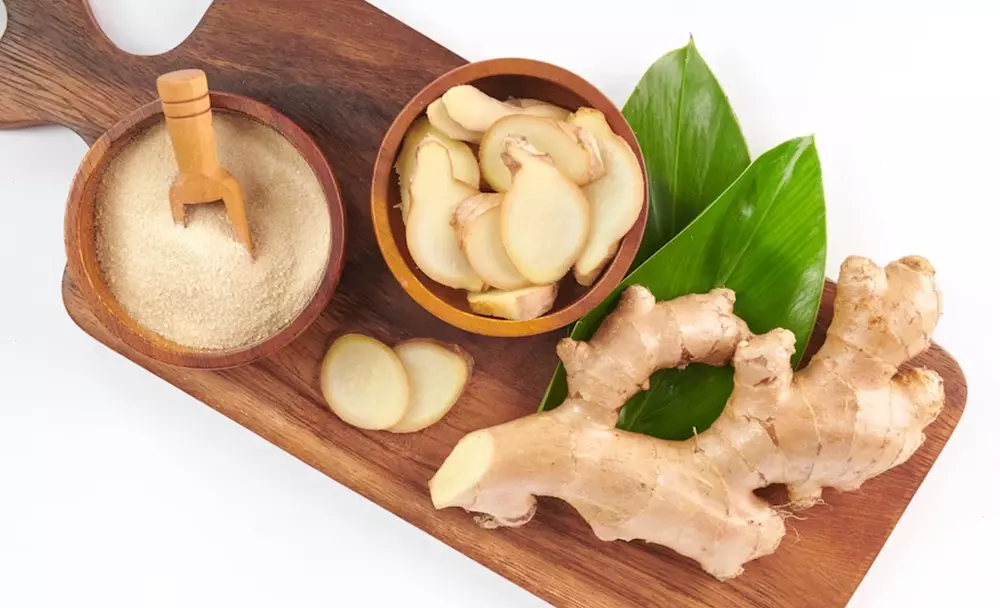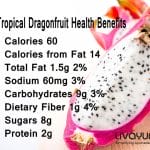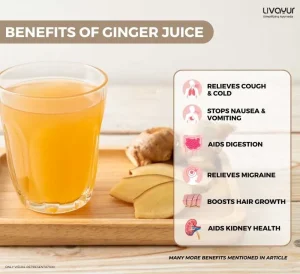
Ginger is a common ingredient in many dishes and has been used for medicinal purposes for centuries. It has a pungent taste and aroma and is rich in bioactive compounds that have several health benefits.
Anti-inflammatory Properties
Primary Benefit: Ginger contains several bioactive compounds such as gingerols and shogaols, which have anti-inflammatory properties. Ginger can help to reduce inflammation and lower the risk of several chronic diseases such as cancer, heart disease, and diabetes.
Secondary Benefit: Ginger can help to relieve pain associated with inflammation, such as osteoarthritis and rheumatoid arthritis. Several studies have shown that ginger can reduce pain and stiffness in these conditions [1].
Anti-nausea Properties
Primary Benefit: Ginger has been used as a natural remedy for nausea and vomiting for centuries. Several studies have shown that ginger can help to reduce nausea and vomiting in pregnant women, cancer patients undergoing chemotherapy, and people undergoing surgery.
Secondary Benefit: Ginger can also help to relieve motion sickness and seasickness. A study showed that taking ginger capsules reduced symptoms of motion sickness such as dizziness, nausea, and vomiting [2].
Digestive Health
Primary Benefit: Ginger can help to improve digestion by increasing the production of digestive enzymes and reducing inflammation in the gut. This can help to relieve symptoms of digestive disorders such as bloating, constipation, and indigestion.
Secondary Benefit: Ginger can also help to reduce the risk of gastrointestinal cancers such as colorectal cancer. A study showed that ginger extract reduced the growth of cancer cells in the colon [3].
Immune System Boost
Primary Benefit: Ginger can help to boost the immune system by increasing the production of immune cells such as T-cells and cytokines.
Secondary Benefit: Ginger can also help to reduce the severity and duration of cold and flu symptoms. A study showed that taking ginger supplements reduced the duration and severity of cold and flu symptoms [1].
Lower Cholesterol Levels
Primary Benefit: Ginger can help to lower cholesterol levels by reducing the absorption of cholesterol in the gut and increasing the excretion of cholesterol through the liver. This can help to reduce the risk of heart disease and stroke.
Secondary Benefit: Ginger can also help to improve blood lipid profiles by reducing triglyceride levels and increasing HDL (good) cholesterol levels [4].
Lower Blood Sugar Levels
Primary Benefit: Ginger can help to lower blood sugar levels by increasing insulin sensitivity and reducing insulin resistance. This can help to reduce the risk of type 2 diabetes and metabolic syndrome.
Secondary Benefit: Ginger can also help to improve blood sugar control in people with type 2 diabetes [4].
Pain Relief
Primary Benefit: Ginger can help to relieve pain associated with several conditions such as menstrual pain, migraine, and muscle soreness. This is due to its anti-inflammatory and analgesic properties.
Secondary Benefit: Ginger can also help to reduce postoperative pain. A study showed that taking ginger supplements before surgery reduced the need for pain medication after surgery [5].

Brain Function
Primary Benefit: Ginger can help to improve brain function by increasing the production of neurotransmitters such as dopamine and serotonin. This can improve mood, memory, and cognitive function.
Secondary Benefit: Ginger can also help to reduce the risk of age-related cognitive decline and neurodegenerative diseases such as Alzheimer’s and Parkinson’s disease. Gingerols and other compounds in ginger have been shown to have neuroprotective properties and can help to reduce inflammation in the brain [6].
Reduces Exercise-Induced Muscle Pain
Primary Benefit: Ginger has been shown to be effective in reducing muscle pain and soreness that occurs after intense exercise.
Secondary Benefit: Ginger may also improve muscle recovery and reduce muscle damage caused by exercise [1].
Relieves Menstrual Cramps
Primary Benefit: Ginger can help to relieve menstrual cramps by reducing inflammation and pain in the uterus.
Secondary Benefit: Ginger can also help to reduce the severity and frequency of other menstrual symptoms, including headaches, nausea, and fatigue [7].
Improves Respiratory Function
Primary Benefit: Ginger can help to improve respiratory function by reducing inflammation in the airways. This can be beneficial for people with respiratory conditions such as asthma and chronic obstructive pulmonary disease (COPD).
Secondary Benefit: Ginger can also help to reduce symptoms of respiratory infections such as cough, congestion, and sore throat. A study showed that taking a combination of ginger, honey, and lemon improved symptoms of acute respiratory infection [8].
Boosts Cardiovascular Health
Primary Benefit: Ginger can help to improve cardiovascular health by reducing inflammation, oxidative stress, and blood pressure. This can help to reduce the risk of heart disease and stroke.
Secondary Benefit: Ginger can also help to improve blood circulation and reduce blood clots. A study showed that taking ginger supplements reduced platelet aggregation and blood clotting [9].
Improves Skin Health
Primary Benefit: Ginger can help to improve skin health by reducing inflammation and promoting collagen production. This can help to reduce signs of aging such as wrinkles and fine lines.
Secondary Benefit: Ginger can also help to reduce skin damage caused by UV radiation and environmental pollutants. A study showed that applying ginger extract to the skin reduced UV-induced skin damage [1].
Enhances Sexual Function
Primary Benefit: Ginger can help to enhance sexual function by improving blood flow and reducing oxidative stress. This can be beneficial for people with erectile dysfunction or low libido.
Secondary Benefit: Ginger can also help to reduce symptoms of premenstrual syndrome (PMS) such as cramps and mood swings, which can improve sexual function in women [10].
Improves Dental Health
Primary Benefit: Ginger can help to improve dental health by reducing inflammation and preventing bacterial growth in the mouth. This can help to prevent gum disease and tooth decay.
Secondary Benefit: Ginger can also help to reduce bad breath and improve oral hygiene. A study showed that rinsing with a ginger mouthwash reduced bad breath and plaque formation [11].
Conclusion
Ginger has been used as a traditional medicine for thousands of years, and modern research has confirmed many of its health benefits. From reducing inflammation and pain to improving brain function and reducing the risk of chronic diseases, ginger is a versatile and effective health-promoting food. Incorporating it into your diet is a simple way to take advantage of these ginger health benefits and improve your overall health and well-being.
Disclaimer: This article is written from a health and lifestyle perspective.
References:
- https://www.ncbi.nlm.nih.gov/pmc/articles/PMC3665023/
- https://www.ncbi.nlm.nih.gov/pmc/articles/PMC3665023/
- https://www.ncbi.nlm.nih.gov/pmc/articles/PMC6341159/
- https://www.ncbi.nlm.nih.gov/pmc/articles/PMC4277626/
- https://link.springer.com/article/10.1186/1472-6882-12-92
- https://www.ncbi.nlm.nih.gov/pmc/articles/PMC8971783/
- https://www.ncbi.nlm.nih.gov/pmc/articles/PMC8021506/
- https://www.ncbi.nlm.nih.gov/pmc/articles/PMC3604064/
- https://www.ncbi.nlm.nih.gov/pmc/articles/PMC6721508/
- https://www.healthline.com/nutrition/ginger-for-sex
- https://www.ncbi.nlm.nih.gov/pmc/articles/PMC8336769/





















